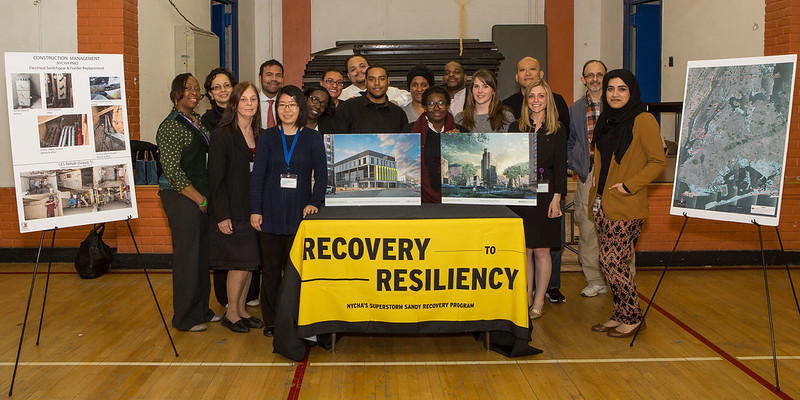
NYCHA recovery and resiliency (photo: NYCHA)
Growing up in Section 8 housing on the Lower East Side in the ‘80s and ‘90s, I saw how large an impact the city’s infrastructure investments could have. From the restoration of Hamilton Fish pool across the street from my apartment that gave us a place to cool off in the summer, to the major renovation of the Williamsburg Bridge that made it easier for us to visit our relatives in Brooklyn, to the much-needed renovations at Bellevue Hospital that improved the quality of healthcare for our neighborhood.
Given the limited resources of our diverse, vibrant community, infrastructure improvements like these went a long way towards making New York a more livable city for us. Unfortunately, all too often, the city has a history of neglecting the infrastructure that serves low-income communities, and this disinvestment feeds vicious cycles of poverty and struggle.
Now, in the face of a changing climate, there is consensus that the city’s infrastructure must adapt quickly, and it is critical that we do this without leaving the most vulnerable behind. As we enter the midpoint of hurricane season this month, and remember the devastation and destruction from Superstorm Sandy ten years ago this October, it is time that we make a real plan to double down on the resiliency efforts and infrastructure improvements of the last decade and make investments in the future, not just in our buildings but also in the people who live here.
In New York’s 10th Congressional District, which I am running to represent, there are more than 18,000 families living in public housing, 96% of which is located in an Evacuation Flood Zone. These properties are home to tens of thousands of New Yorkers, all of whom are on the front line of the next major weather event and climate change more broadly. They will be the first to feel the destructive impacts of the next major storm whenever it arrives. The time is now for leadership at all levels of government to prioritize investing in at-risk NYCHA properties and their broader communities.
We must empower the New Yorkers who live in these low-lying areas and provide support to the strong community networks they’ve formed. We should be training individuals with the skills they need to create resilient neighborhoods and to ensure safety and security for themselves and their loved ones and neighbors in the event of a disaster. This means establishing and funding workforce training programs today that provide urgently needed skills such as retrofitting buildings and making other energy efficient improvements throughout neighborhoods.
We should put our young residents on a path of development to learn about the green building and construction jobs of tomorrow. By dedicating dollars to this pipeline now, we will begin to lay the foundation that future generations can build upon moving forward. We also need to invest in the backbone of our city, including our faith leaders, our teachers, our small business owners, and so many others who are grounded in our neighborhoods and are protectors of these communities. By supporting these local leaders and their institutions, we are ensuring safety for even our most vulnerable New Yorkers.
In addition to the individuals who will collectively grow together to make our neighborhoods stronger and more resilient, it's imperative that leadership at all levels of government join together to put real money into infrastructure investment. Last November, President Biden signed the $1.2 trillion Bipartisan Infrastructure Law, which includes significant funding to make our infrastructure resilient against the impacts of climate change. I applaud these efforts, but our leadership in Congress must ensure some of this funding goes to protecting our NYCHA residents on the front lines of the climate threat.
If coupled with meaningful action by New York City to center resilience in NYCHA’s capital improvements program, our efforts can do right by these communities that have historically been so wronged.
We must unlock NYCHA funding that was promised in the Build Back Better agenda, but Congress has not delivered. This funding is desperately needed for climate resilience as well as the $40 billion capital backlog for a wide variety of repairs in NYCHA, including water, heating, power, elevators, and more related to health, safety, and quality of life.
Critically, no New York City congressional representative currently sits on the House Committee on Transportation and Infrastructure, where so many of these decisions are made. If elected, I will ask to sit on that committee to give NYCHA residents a voice in that process.
I understand that a true resiliency plan anchored around public housing in New York City will cost billions and take years to build, but the investment is unequivocally necessary. As climate change progresses, extreme weather events like Sandy and Ida will become more frequent and more dangerous to our communities, especially those on the front lines like NYCHA. Our future depends on our investments right now, and our leadership at the federal, state, and city levels must prioritize these efforts and work together to ensure a strong and stable future for this city.
***
Carlina Rivera is a City Council member and Democratic candidate for Congress in the 10th district. On Twitter @CarlinaRivera.
***
Have an op-ed idea or submission for Gotham Gazette? Email This email address is being protected from spambots. You need JavaScript enabled to view it.




